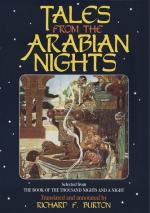[FN#88] Arab. “Al-’Akik,” vol. iii. 179: it is a tradition of the Prophet that the best of bezels for a signet-ring is the carnelian, and such are still the theory and practice of the Moslem East.
[FN#89] Arab. “Tuhal;” in text “Tayhal.” Mr. Doughty (Arabia Deserta, i. 547) writes the word “Tahal” and translates it “ague-cake,” i.e. the throbbing enlarged spleen, left after fevers, especially those of Al-Hijaz and Khaybar. [The form “Tayhal” with a plural “Tawahil” for the usual “Tihal” = spleen is quoted by Dozy from the valuable Vocabulary published by Schiaparelli, 1871, after an old Ms. of the end of the xiii. century. It has the same relation to the verb “tayhal” = he suffered from the spleen, which “Tihal” bears the same verb “tuhil,” used passively in the same sense. The name of the disease is “Tuhal.”—St]
[FN#90] In text “Kasalah” = a shock of corn, assemblage of sheaves. It may be a clerical error for “Kasabah” = stalk, haulm, straw.
[FN#91] Of course the conversation drifts into matters sexual and inter-sexual: in a similar story, “Tawad dud,” the learned slave girl, “hangs her head down for shame and confusion” (vol. v. 225); but the young Sayyid speaks out bravely as becomes a male masculant.
[FN#92] [In the text: “Allati lau nazarat ila ’l-sama la-a’shab (fourth form of ’ashab with the affirmative ‘la’) al-Safa (pl. of Safat), wa lau nazarat ila ’l-arz la amtar taghru ha (read thaghru-ha) Luluan lam yuskab wa riku-ha min al-Zulal a’zab (for a’zab min al-Zulal),” which I would translate: Who if she look upon the heavens, the very rocks cover themselves with verdure, and an she look upon the earth, her lips rain unpierced pearls (words of virgin eloquence) and the dews of whose mouth are sweeter than the purest water. — St.]
[FN#93] These lines have often occurred before: see index (vol. x. 395) “Wa lau anunaha li ’l-Mushrikin,” etc. I have therefore borrowed from Mr. Payne, vol. viii. 78, whose version is admirable.
[FN#94] For the Jahin-hell, see vol. viii. 111.
[FN#95] For the Seven Ages of womankind (on the Irish model) see vol. ix. 175. Some form of these verses is known throughout the Moslem East to prince and peasant. They usually begin:—
From the tenth to the twentieth year * To the gaze
a charm doth
appear;
and end with:—
From sixty to three score ten * On all befal Allah’s malison.
[FN#96] [Here I suppose the word “kal” has been dropped after “bi ’l-shi’r,” and it should be: He (the youth) replied, that was our common sire, Adam, etc.—st.]
[FN#97] “Habil” and “Kabil” are the Arab. equivalent of Abel and Cain. Neither are named in the Koran (Surah v. “The Table,” vv. 30-35), which borrows dialogue between the brothers derived from the Targum (Jeirus. on Gen. iv. 8) and makes the raven show the mode of burial to Cain, not to Adam, as related by the Jews. Rodwell’s Koran, p. 543.




